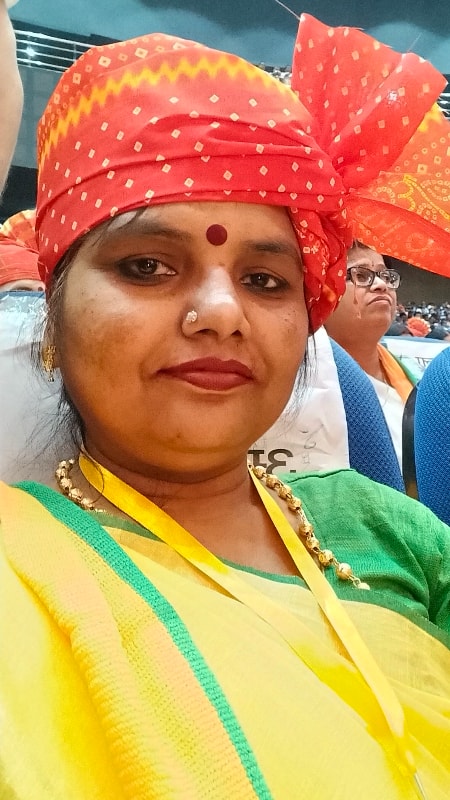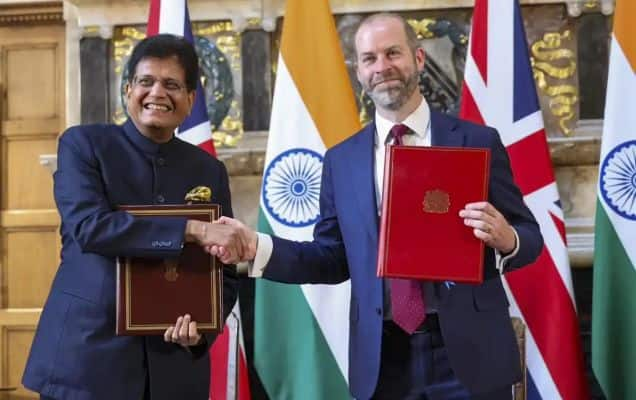Dr. Karan Singh Ji, Muzaffar Ali Ji, Meera Ali Ji, other dignitaries, ladies and gentlemen present in the programme!
It is very natural to be happy after coming to Jahan-e-Khusrau today. The spring that Hazrat Amir Khusrau was crazy about, that spring is not only present in the season here in Delhi today, but is also present in the atmosphere of Jahan-e- Khusrau. In the words of Hazrat Khusrau-
सकल बन फूल रही सरसों, सकल बन फूल रही सरसों,
अम्बवा फूटे टेसू फूले, कोयल बोले डार-डार...
(Mustard is blooming in the entire forest, Mango tree is blooming, Tesu is blooming, cuckoo is singing from branch to branch...)
The atmosphere here is indeed something like this. Before coming to the gathering, I had the opportunity to visit the market (Tah Bazaar). After that, I also exchanged greetings with some friends in Bagh-e-Firdaus. Now, Nazar-e-Krishna and the various events that took place, amidst the inconveniences the mike has its own strength for the artist, but even after that, whatever they tried to present with the help of nature, they too might have been a little disappointed. Those who had come to enjoy this event may have been disappointed. But sometimes such occasions leave us with a lesson in life. I believe that today's occasion will also leave us with a lesson.
Friends,
Such occasions are important for the country's art and culture, they also provide solace. This series of Jahan-e- Khusrau is completing 25 years. The fact that this event has made a place in the minds of people in these 25 years is in itself its biggest success. I congratulate Dr. Karan Singh Ji, my friend Muzaffar Ali Ji, sister Meera Ali Ji and other associates for this. I wish the Rumi Foundation and all of you the very best of luck for this bouquet of Jahan-e-Khusrau to keep blooming like this. The holy month of Ramadan is also about to begin. I wish Ramadan Mubarak to all of you and all the countrymen. Today I have come to Sunder Nursery, so it is quite natural for me to remember His Highness Prince Karim Aga Khan. His contribution in decorating and beautifying Sunder Nursery has become a boon for millions of art lovers.
Friends,
Sarkhej Roza has been a major center of Sufi tradition in Gujarat. At one point of time, its condition had deteriorated due to the blows of time. When I was the Chief Minister, a lot of work was done on its restoration and very few people would know that there was a time when Krishna Utsav was celebrated with great pomp and show in Sarkhej Roza and it was made in large quantities and even today we were all immersed in the colour of Krishna devotion here. I also used to participate in the annual Sufi music programme held in Sarkhej Roza on an average. Sufi music is a shared heritage that we all have lived together. We all have grown up like this. Now the presentation of Nazar-e-Krishna here also reflects our shared heritage.
Friends,
There is a different fragrance in this event of Jahan-e-Khusrau. This fragrance is of the soil of Hindustan. That Hindustan which Hazrat Amir Khusrau compared to heaven. Our Hindustan is that garden of heaven, where every colour of culture has flourished. There is something special in the nature of the soil here. Perhaps that is why when the Sufi tradition came to India, it also felt as if it had become connected with its own land. Here, the spiritual talks of Baba Farid gave peace to the hearts. The gatherings of Hazrat Nizamuddin lit the lamps of love. The words of Hazrat Amir Khusrau strung new pearls and the result that came out was expressed in these famous lines of Hazrat Khusrau.
बन के पंछी भए बावरे, बन के पंछी भए बावरे,
ऐसी बीन बजाई सँवारे, तार तार की तान निराली,
झूम रही सब वन की डारी।
(The birds of the forest have gone mad, Sanware played such a beautiful flute, the tune of each string is unique, All the branches of the forest are dancing.)
The Sufi tradition created a distinct identity for itself in India. Sufi saints did not limit themselves to mosques or khanqahs, they read the letters of the Holy Quran and also listened to the Vedas. They added the sweetness of devotional songs to the sound of the Azan and hence what the Upanishads called एकं सत् विप्रा बहुधा वदन्ति (Ekam Sat Vipra Bahudha Vadanti) in Sanskrit, Hazrat Nizamuddin Auliya said the same thing by singing Sufi songs like हर कौम रास्त राहे, दीने व किब्ला गाहे (Har Qaum Raast Rahe, Deen-e-Kibla Gahe). Different language, style and words but the message is the same. I am happy that today Jahan-e-Khusrau has become a modern identity of the same tradition.
Friends,
The civilization and culture of any country gets its voice from its songs and music. It gets its expression through art. Hazrat Khusrau used to say that there is a hypnotism in this music of India, such a hypnotism that the deer in the forest used to forget the fear of their life and become still. Sufi music came as a different flow in this ocean of Indian music and it became a beautiful wave of the ocean. When those ancient streams of Sufi music and classical music joined each other, we got to hear a new sound of love and devotion. This is what we found in Hazrat Khusrau's Qawwali. This is where we found Baba Farid's couplets. Bulleh Shah's voice, Mir's songs, here we found Kabir, Rahim and Raskhan. These saints and Aulias gave a new dimension to devotion. Whether you read Surdas or Rahim and Raskhan or you listen to Hazrat Khusrau with your eyes closed, when you go deep, you reach the same place. This place is the height of spiritual love where human restrictions are broken and the union of man and God is felt. You see, our Raskhan was a Muslim, but he was a Hari devotee. Raskhan also says- प्रेम हरी को रूप है, त्यों हरि प्रेम स्वरूप। एक होई द्वै यों लसैं, ज्यौं सूरज अरु धूप॥ That is, both love and Hari are the same form, like the sun and the sunshine and Hazrat Khusrau also had this feeling. He had written खुसरो दरिया प्रेम का, सो उलटी वा की धार। जो उतरा सो डूब गया, जो डूबा सो पार।। That is, only by immersing in love, the barriers of discrimination are crossed. We have also felt the same in the grand presentation that took place here.
Friends,
The Sufi tradition has not only bridged the spiritual distances between humans, but has also reduced the distances in the world. I remember when I went to the Parliament of Afghanistan in 2015, I remembered Rumi there in very emotional words. Eight centuries ago, Rumi was born in the Balkh province there. I would definitely like to repeat a Hindi translation of Rumi's writings here because these words are equally relevant even today. Rumi had said, give importance to words, not to voice, because flowers are born in rain, not in storm. I remember one more thing of his, if I say it in local words, it means, I am neither from the east nor from the west, neither I came from the sea nor I came from the land, there is no place for me, there is none, I do not belong to any place, that is, I am everywhere. This thought, this philosophy is not different from our spirit of Vasudhaiva Kutumbakam. These thoughts give me strength when I represent India in different countries of the world. I remember, when I went to Iran, during the joint press conference I recited a couplet of Mirza Ghalib there-
जनूनत गरबे, नफ्से-खुद, तमाम अस्त।
ज़े-काशी, पा-बे काशान, नीम गाम अस्त॥
That is, when we wake up, we see the distance between Kashi and Kashan is only half a step. Indeed, in today's world, where war is causing such a great loss to humanity, this message can be very useful.
Friends,
Hazrat Amir Khusrau is called 'Tuti-e-Hind'. The songs he sang in praise of India, in love for India, the description of the greatness and charm of Hindustan is found in his book Nuh-Sipihr. Hazrat Khusrau described India as greater than all the big countries of the world of that time. He called Sanskrit the best language in the world. He considered the sages of India to be greater than the great scholars. How did the knowledge of zero, mathematics, science and philosophy in India reach the rest of the world? How did Indian mathematics reach Arabia and became known as Hindsa there? Hazrat Khusrau not only mentions it in his books, but is also proud of it. If we are familiar with our past today when so much was destroyed during the long period of slavery, then the writings of Hazrat Khusrau have a big role in it.
Friends,
We have to keep enriching this heritage. I am satisfied that the efforts like Jahan-e-Khusrau are fulfilling this responsibility very well and doing this work continuously for 25 years is not a small feat. I congratulate my friend very much. I once again congratulate all of you for organising this event. Despite some difficulties, I got some opportunity to enjoy this function, for this I express my heartfelt gratitude to my friend. Thank you very much! Thank you very much


























